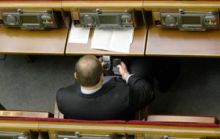The current season is decisive for both the government and the opposition. It will determine the character of the year 2011. It will answer the question: Who will retire as a politician and what new actors will appear? Will the authoritarian project celebrate its final victory? Will the Ukrainian democracy become “managed,” following the Russian example?
Both Viktor Yanukovych and Mykola Azarov want to be perceived as reformers. It’s important for their image, for getting IMF loans, and for Western visits. By the way, the coalition’s name is “Stability and Reforms.” But is the current government really a reformer? Thus far this question remains unanswered. This fall will show: is this team capable of reforms or only promises? So far stability prevails over reforms. The process of the tax code adoption is delayed; the government has been working on this document for over four months.
The growth of utilities prices and raising the retirement age can’t really be considered a reform. Both are necessary, but these are not reforms.
It looks that the chief reform of this political season will be of a reverse character — canceling the political reform. The decision about shifting to a presidential form of governance, in all appearance, has already been made. Both the president and his team are mentally ready for this.
The resignation of the four Constitutional Court judges and the appointment of new ones (three of them originally come from eastern Ukraine) is a clear signal. However, even without those changes the Constitutional Court would have enough people willing to vote for the reform cancellation. As The Day already wrote, in this case a legal vacuum can appear, which will have to somehow be filled. It would be a mistake to think that the Constitution of 1996 will automatically become effective. Most likely, haggling will start right after the verdict of the Constitutional Court. The main question is whether a constitutional majority will be found in the Verkhovna Rada. This is where Yanukovych and his team may encounter a problem. Actually, all those who could be broken and bought already joined the coalition individually. The reserves are very small. The closer they move towards the desirable “300,” the higher the stakes will be.
If the Party of Regions’ plan succeeds, the parliament will become a formality. The role of the factions’ leaders will decrease considerably and perhaps there will be no need for a coalition, and this political “ordeal” will become a thing of the past.
There is no particular hope from Europe. We should hope for a people’s revolt either. Political tourists and professional protesters discredited the very idea of a mass protest.
“We should expect a shift from political methods of governing to administrative ones,” believes the political scientist Ihor Zhdanov. “However, there is always a lack of authorities. There was the case when the current Constitution was adopted in 1996 and Leonid Kuchma expressed his discontent with the head of the administration: ‘What did you adopt? I’m powerless according to this Constitution!’ Certainly, compared with the constitutional agreement according to which he could appoint the prime minister without anyone’s consent, the presidential powers have been reduced. Today we believe that the Constitution of 1996 provides very broad powers for the president.”
However, it is still unknown whether President Yanukovych will benefit from unlimited power after all. Rolling back the political reform, Yanukovych should have thought of who can become president in four years. He has to consider who will be in power later. What about the opposition? Many experts point out that Tymoshenko is going through a crisis. We hear the same rhetoric, the same messages she had two or three years ago. Everyone understands that if Tymoshenko had become president, she would also have raised the retirement age and cooperated with the IMF.
Last plenary week it was very interesting to observe how the Bloc of Yulia Tymoshenko blocked the tri-bune. Both Tymoshenko’s and the Party of Regions’ deputies were on the same side. The mortal opponents exchanged words, jokes. When Volodymyr Lytvyn appeared and started the session as if nothing happened, it became clear that there would be no special confrontation, and the faction of the Bloc of Yulia Tymoshenko just came to show off before cameras: look, we are fighting for people’s interests.
No wonder Tiahnybok’s radical Svoboda is beginning to look good. So far it is Tymoshenko’s only big partner within the People’s Committee to Protect Ukraine group.
“Tiahnybok’s Svoboda responds to basic instinct,” says political scientist Vadym Karasiov. “One should distinguish between basic instinct and courtly love. Courtly love is an art. But Svoboda is a political instinct. One doesn’t need to be very smart to say that Jews, oligarchs or foreigners are to blame for everything. While building an opposition, feigning love is a big problem. This is a problem requiring time.”
Ukrainian politics has a unique phenomenon, called the semi-opposition. At this, its range is very wide: Viktor Baloha’s United Center, Serhii Tihipko’s Strong Ukraine, and even the Communists — the Party of Regions’ partners in the coalition. United Center already named itself a “constructive opposition.” This means that no one is going to “fight the Yanukovych’s regime” there.
Viacheslav Kyrylenko, the leader of the party For Ukraine!, recently appealed in Lviv once again for the whole opposition to unite. He said, “There should be a united opposition fist on ultimate questions.” One must admit that it has become a tradition already: once a week an opposition leader thinks it’s an obligation to appeal to his colleagues to unite.
It’s already clear that this fist will not exist. Neither now, nor after the local elections. There are too many hetmans and too few really responsible people.







